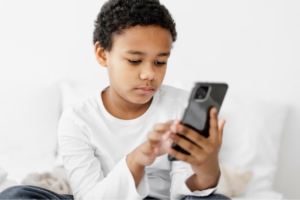We live in an age where technology has become an integral part of our lives, and children are being given cell phones at younger and younger ages. Inspired by the beloved children’s book “If You Give a Mouse a Cookie,” let’s discuss the topic of giving a kid a cell phone and the crucial responsibility of parents in guiding their children to make wise choices in the digital age.
The Digital Landscape for Kids
In today’s digital landscape, it’s increasingly common for children to have their own phones. While cell phones offer numerous benefits such as enhanced learning and communication, they also present challenges. As parents, it’s vital to understand the potential risks and equip our children with the tools to navigate this digital world responsibly.
The Ripple Effect of Cell Phone Usage
One significant issue that arises is children posting videos and comments about others without comprehending the consequences. Often, there is no malicious intent; rather, they view it as a funny joke. However, these actions can be harmful and have a profound impact on the well-being of their peers. As parents, it’s crucial to address this issue and guide our children towards becoming responsible digital citizens.
Nurturing Responsible Phone Usage
To tackle this problem, we must teach our children the importance of empathy, kindness, and respect in their online interactions. It starts with open and honest conversations about the potential impact of their words and actions. By setting boundaries and modeling appropriate behavior ourselves, we can guide our children to make informed decisions and treat others with respect, both online and offline.

Empowering Kids to Make Good Decisions
Empowering our children to make good decisions in the digital age requires educating them about the concept of digital citizenship. We need to help them understand the importance of considering others’ feelings, privacy, and well-being when posting or commenting online. By instilling critical thinking skills and teaching them to think before they act, we can guide them towards making positive choices in their digital interactions.
Monitoring Online Usage
Monitoring children’s online usage closely is crucial, especially for younger children between the ages of five and ten. At this age, they may not fully grasp the potential risks and consequences of their actions in the digital world. Therefore, as parents, we need to prioritize their safety and well-being by closely monitoring their online activities. By doing so, we can guide them towards making responsible choices online, teach them about appropriate behavior, and help them develop the skills to navigate the digital world safely.
Raising Digital Citizens
Just like the story of “If You Give a Mouse a Cookie,” giving a kid a cell phone sets off a series of events that can have a profound impact. As parents, we hold the key to shaping our children’s digital journeys. By nurturing responsible phone usage, we can help them understand the consequences of their actions, especially when posting videos or comments about others. It’s our shared responsibility to educate them about empathy, kindness, and respect in the digital world.
Let’s embrace the benefits of technology while equipping our children with the necessary tools to navigate it responsibly. Together, let’s create a culture of digital citizenship where our children learn to make thoughtful decisions, treat others with respect, and contribute positively to the online community.

